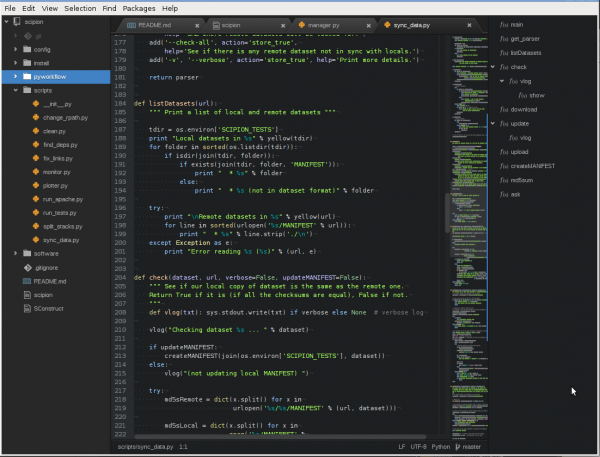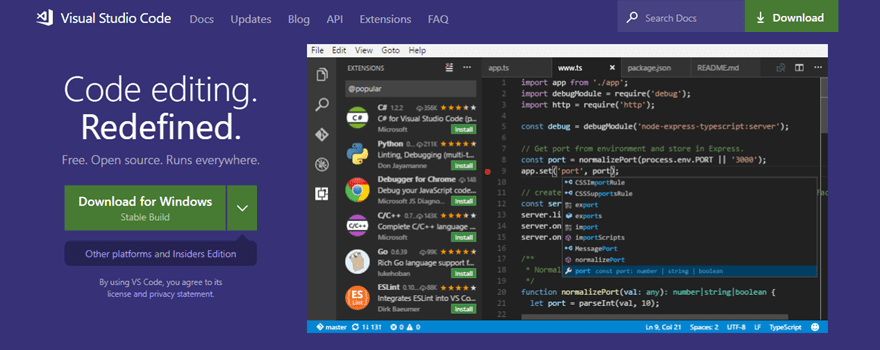The source files for C programs are typically named with the extension '.c'. Before starting your programming, make sure you have one text editor in place and you have enough experience to write a computer program, save it in a file, compile it and finally execute it. The source code written in source file is the human readable. Cocoa is the most native API that can be used to develop applications for Mac OS X that are truly 'Mac-like'. Generally, Objective-C will be used along with Cocoa, though there are other options such as Cocoa-AppleScript and Cocoa-Python, but Cocoa-Objective-C is really the 'mainstream' way to develop Cocoa applications.
What's New in CodeRunner 4
CodeRunner 4 is a huge update with hundreds of new features and improvements, including:
- Error Checking and Linting. Get instant feedback on your code as you write it. CodeRunner checks your document for errors and common issues, underlining mistakes and describing the problem directly inline with your code. Compile and runtime issues in the console are automatically highlighted and included in the document. It's also easy to add support for third-party linters.
- Multiple Selections. CodeRunner 4's new editor supports fully context-independent multiple selections. Hold Command, Option, or Control-Shift while clicking or dragging to add multiple selections anywhere, allowing you to quickly make similar edits in multiple locations at once.
- Improved Highlighting with Code Tokenizers. Local variables, functions, and other code tokens are now highlighted on top of CodeRunner's powerful grammar-based syntax highlighting. In addition to providing better highlighting, this allows for quick and precise renaming of variables and other symbol names.
- Auto-Indent. All indentation functionality has been rewritten to be smarter and more deeply integrated into the editor. You can explicitly Auto-Indent an existing block of code using Control-I, but this is rarely needed since Auto-Indent is applied automatically as you type and when pasting code.
- Customizable Key Bindings. You can now customize the hundreds of existing keyboard shortcuts, and even add new shortcuts and macros directly in CodeRunner Preferences. A new Vim mode is also included.
 Other notable features and improvements:
Other notable features and improvements: - New Find and Replace with support for regular expressions, multiple selections, and more.
- Improved code completion with extra-fuzzy search, completions beyond single words, and better documentation.
- Smart spell checking that ignores code and automatically checks segments of natural language.
- Improved debug console with syntax highlighting, code completion, and output filtering.
- Shell Script code completion for commands and their options, paths, and snippets, with built-in man-page lookups.
- Performance improvements delivering extremely fast syntax highlighting, code completion, and overall performance.
- Automatic closing of tags and other smart behaviors while typing.
- More customizable editor with a large number of new preferences and tweak-able behaviors.
- Select code structures by double-clicking edges of tag pairs, functions, if/else blocks, loops, etc.
- Node.js debugger, atomic spaces indentation, language groups, improved help, new keyboard shortcuts, and more.
- C Programming Tutorial
- C Programming useful Resources
- Selected Reading

If you want to set up your environment for C programming language, you need the following two software tools available on your computer, (a) Text Editor and (b) The C Compiler.
Text Editor
This will be used to type your program. Examples of few a editors include Windows Notepad, OS Edit command, Brief, Epsilon, EMACS, and vim or vi.
The name and version of text editors can vary on different operating systems. For example, Notepad will be used on Windows, and vim or vi can be used on windows as well as on Linux or UNIX.
The files you create with your editor are called the source files and they contain the program source codes. The source files for C programs are typically named with the extension '.c'.
Before starting your programming, make sure you have one text editor in place and you have enough experience to write a computer program, save it in a file, compile it and finally execute it.

The C Compiler
Best Programs For Mac
The source code written in source file is the human readable source for your program. It needs to be 'compiled', into machine language so that your CPU can actually execute the program as per the instructions given.
The compiler compiles the source codes into final executable programs. The most frequently used and free available compiler is the GNU C/C++ compiler, otherwise you can have compilers either from HP or Solaris if you have the respective operating systems.
The following section explains how to install GNU C/C++ compiler on various OS. We keep mentioning C/C++ together because GNU gcc compiler works for both C and C++ programming languages.
Installation on UNIX/Linux

If you are using Linux or UNIX, then check whether GCC is installed on your system by entering the following command from the command line −
If you have GNU compiler installed on your machine, then it should print a message as follows −
If GCC is not installed, then you will have to install it yourself using the detailed instructions available at https://gcc.gnu.org/install/
This tutorial has been written based on Linux and all the given examples have been compiled on the Cent OS flavor of the Linux system.
Installation on Mac OS
If you use Mac OS X, the easiest way to obtain GCC is to download the Xcode development environment from Apple's web site and follow the simple installation instructions. Once you have Xcode setup, you will be able to use GNU compiler for C/C++.
Xcode is currently available at developer.apple.com/technologies/tools/.
Installation on Windows
To install GCC on Windows, you need to install MinGW. To install MinGW, go to the MinGW homepage, www.mingw.org, and follow the link to the MinGW download page. Download the latest version of the MinGW installation program, which should be named MinGW-<version>.exe.
Why Mac For Coding
While installing Min GW, at a minimum, you must install gcc-core, gcc-g++, binutils, and the MinGW runtime, but you may wish to install more.
Add the bin subdirectory of your MinGW installation to your PATH environment variable, so that you can specify these tools on the command line by their simple names.
Best Program For Coding C Machines
After the installation is complete, you will be able to run gcc, g++, ar, ranlib, dlltool, and several other GNU tools from the Windows command line.
